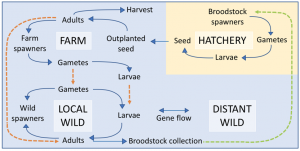The shellfish aquaculture industry in the United States is valued at over $300 million annually, and is rapidly growing with increasing global demand for marine protein. Environmental impacts of this expansion are threatening to limit the growth of the industry. One of these potential impacts is the risk of introducing invasive species, and so there is increased interest in the aquaculture of native species. However, aquaculture of native species poses genetic risks to wild populations if captive and wild animals interbreed. Wild populations represent important natural resources, are often the target of commercial, treaty, and recreational fisheries, and provide the genetic material for broodstock to fuel the aquaculture industry. Decades of research have quantified these genetic risks in finfish, but information in shellfish species is relatively scant, resulting in considerable uncertainty in the development and implementation of regulatory guidelines governing aquaculture operations.
The proposed research will address these uncertainties, and is a direct outcome of a stakeholder workshop focused on genetic concerns of native shellfish aquaculture convened by the Washington Department of Fish and Wildlife (WDFW) and comprising a diverse group of stakeholders from industry, state and federal government, tribes, non-profits, and academia. Participants concluded the meeting by asserting the pressing need for risk assessment tools to form best management practices for native species cultivated in Washington State. As workshop participants, we intend to fill those information gaps directly with stakeholder input.
Our project will provide tools to improve the understanding of the environmental effects of native shellfish aquaculture that will facilitate informed permit and management decision-making. These tools will be designed to be generally applicable in all US regions. We will seek initial input from stakeholders, and, as case studies, conduct risk assessments for three native cultured shellfish species (representing varying degrees of data availability and quality), and provide decision support to inform regulations governing permitting and monitoring efforts more broadly.

Researchers: Natalie Lowell (PhD student)
Collaborators: Brent Vadopalas (SAFS), Eric Ward (NOAA), Robert Sizemore (WDFW), Bobbi Hudson (Pacific Shellfish Institute), Benoit Eudeline (Taylor Shellfish)
Funding: NOAA Saltonstall Kennedy Program, NOAA National Sea Grant Aquaculture Program